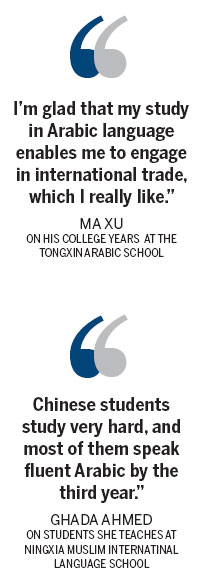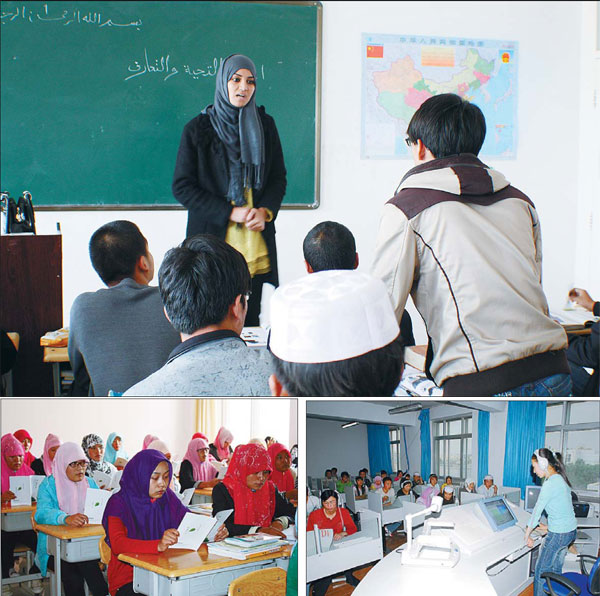Arabic language opens doors for Chinese
Updated: 2013-05-08 05:51
By Mu Qian (China Daily)
|
||||||||
|
Tunisian teacher Nabila Ahmed (pictured) and her sister Ghada are among the three foreign teachers at Ningxia Muslim International Language School (top). The school has more than 1,200 students, most of whom are from the Hui ethnic group (above left). Tongxin Arabic School helps local youths secure better jobs in developed areas (above right). Photos provided to China Daily |
Students in the Ningxia Hui autonomous region are taking advantage of their Muslim background to do business with the Middle East. Mu Qian reports.
In Northwestern China's Ningxia Hui autonomous region, Muslims find knowledge of the Arabic language not only useful in prayers, but also helpful to secure jobs.
"I'm glad that my study in Arabic language enables me to engage in international trade, which I really like," says Ma Xu, 23, a graduate of the Tongxin Arabic School who now works for a Palestinian company in Yiwu, East China's Zhejiang province.
Tongxin, the Chinese county with the largest population of Hui Muslims, is located in arid central Ningxia. Like most people in the poverty-stricken region, Ma felt at a loss about what to do after finishing middle school. While the possibility of finishing high school and getting into university was flimsy, becoming a migrant worker with no special skills did not promise much of a future.
He chose to go to the Tongxin Arabic Language School. His earlier learning of the Arabic alphabet, when his grandfather taught him the Quran, helped him to pick up the language quickly.
In the third year of Arabic school, Ma went to Yiwu to intern at a trade company. He liked it and decided to stay in the city. "There are so many alumni in Yiwu. We have online chat groups, and help each other to find jobs," he says.
Apart from female students who do not want to work away from home, most of Ma's classmates end up in Yiwu or Guangzhou, the two largest bases of small commodities trade in China.
Businessmen from the Middle East make up a large portion of the people who come to shop for small commodities in wholesale, and Arabic interpreters are in high demand. In Yiwu and Guangzhou, most of the Arabic translators are Hui Muslims from Northwestern China, especially Ningxia.
Arabic businessmen buy not only daily necessities like clothes and shoes, but also religious items like beads and audio players of the Quran, which are made in China but find big markets in the Middle East.
Ma's work includes helping clients with goods purchase, business transactions and customs declaration.

Ma says the job was difficult at first, because people from different Middle Eastern countries speak various dialects of Arabic, but says he became adept at practical dialogue in Arabic within a few months.
Many Chinese people with Arabic language skills start as interpreters, and later open their own companies to do international trade with Arabic countries. "When I have enough experience and clients, I will do that too," Ma says.
Tongxin Arabic Language School is China's first public medium-level Arabic language school, founded in 1985. The number of students it enrolls annually has grown from 20 to 200.
In Ningxia, Arabic schools at various levels offer language study, from smaller schools attached to mosques, to Ningxia University's School of Arabic Studies. Many vocational schools, such as Guyuan Agriculture School and Jingyuan Vocational School, have started Arabic programs in recent years.
More private Arabic schools have also appeared. The former Ningxia Muslim Vocational Skills Training School, located in Yongning county, transformed to become the Ningxia Muslim International Language School in 2010.
To teach Arabic, the school sets up classes of different specialties to cater to the employment market. Last year, the school started a class focused on construction because of the many projects by Chinese construction companies in the Middle East. The school plans to open a special class related to oil and gas in September, and a nursing class next year.
According to Ma Fengyong, director of office at Ningxia Muslim International Language School, about 95 percent of their students are from the Hui ethnic group, but there are also some Han students who are children of business people in Yiwu and Guangzhou.
The school now has 1,279 students and 120 faculty members, including three foreign teachers.
"I like my work here, because I enjoy sharing knowledge of the Arabic language with Chinese people," says Ghada Ahmed, a Tunisian teacher at the school. "Chinese students study very hard, and most of them speak fluent Arabic by the third year."
Ghada's sister Nabila Ahmed also works at the school, as an English teacher. English is considered the second most important subject at the school, because it is very useful in international trade.
As a result, each student here has three names - Chinese, Arabic and English.
"When I graduate, I hope I can go abroad for further studies because I want to experience different environments," says Ma Xue, a second year student at the school.
Ma Xue says she would like to study in Malaysia or Iran, and if possible, she also wants to work abroad.
More than 300 graduates of Ningxia Muslim International Language School have already gone abroad to study since it was founded three years ago.
Ningxia is making use of its Muslim background to develop economic ties with Islamic countries. The China-Arab States Economic and Trade Forum has been held annually in Ningxia's capital city Yinchuan since 2010.
In Yongning, a "World Muslim City" was launched last year. The project, which will be completed in eight years with an estimated investment of 23 billion yuan ($3.74 billion), will consist of 23 sub-projects including a World Muslim Folk Culture Street, a convention center and high-end hotels.
The project is part of Ningxia's strategy to become an "inland economic experiment area that opens westwards" and an "international tourism destination for the Muslim world".
This is good news for Ningxia's students of Arabic language, who are expecting to find more chances of employment at home.
"If there are good jobs in Ningxia, I would surely come back," says Ma Xu, who works in Yiwu.
Contact the writer at muqian@chinadaily.com.cn.
(China Daily 05/08/2013 page18)

 Michelle lays roses at site along Berlin Wall
Michelle lays roses at site along Berlin Wall
 Historic space lecture in Tiangong-1 commences
Historic space lecture in Tiangong-1 commences
 'Sopranos' Star James Gandolfini dead at 51
'Sopranos' Star James Gandolfini dead at 51
 UN: Number of refugees hits 18-year high
UN: Number of refugees hits 18-year high
 Slide: Jet exercises from aircraft carrier
Slide: Jet exercises from aircraft carrier
 Talks establish fishery hotline
Talks establish fishery hotline
 Foreign buyers eye Chinese drones
Foreign buyers eye Chinese drones
 UN chief hails China's peacekeepers
UN chief hails China's peacekeepers
Most Viewed
Editor's Picks

|

|

|

|

|

|
Today's Top News
Shenzhou X astronaut gives lecture today
US told to reassess duties on Chinese paper
Chinese seek greater share of satellite market
Russia rejects Obama's nuke cut proposal
US immigration bill sees Senate breakthrough
Brazilian cities revoke fare hikes
Moody's warns on China's local govt debt
Air quality in major cities drops in May
US Weekly

|

|








